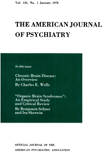Abstract
The number of cases in this survey is too small to justify any conclusions of a statistical nature. However the results of the survey confirm a number of impressions which we have had in casual contacts with considerable numbers of successful officers and soldiers.
In describing the personality of the successful soldier it must be kept in mind that in this study we are dealing with the frontline fighting man below commissioned rank and that in selecting this group we have automatically eliminated on the one hand officers, technical experts, tradesmen and craftsmen, etc., who presumably should be in the higher brackets as regards intelligence rating, academic standing and occupational achievement. On the other hand we have eliminated those who have sought or been placed in labouring, non-combatant or rear area jobs because of mental dullness, emotional inadequacy or other limitations.
It has frequently been suggested that the good soldier is of rather dull mentality and of phlegmatic temperament. In this group average intelligence appeared with the greatest frequency. Most of the men were of a fairly alert, responsive type and only a relatively small group could be said to be definitely phlegmatic. Most were rather casual in manner and not highly imaginative but gave a history which showed a reasonable degree of persistence and initiative. Most of these men were well socialized, liked companionship, enjoyed sports and had never been unduly timid in a physical sense. This general type we considered as the "norm" Those who departed from this "norm" and yet were good soldiers could be classed chiefly in two groups. The first consisted of the sensitive, highly imaginative types, who were compensated for their greater sensitivity by high ideals, personal pride and urge to self-management. In other words, this group of men though showing tendencies to neurotic types of reaction were carried along by a high, persistent personal morale. The second group consisted of recessive or solitary individuals who gave no history of instability but who had developed solitary habits largely due to the circumstances of early life and who consequently were socially timid but when on their own were quite self-reliant. For the most part the men who were good soldiers showed a common tendency to accept situations and to actively adjust to them, to accept responsibilities and to accept discipline. This tendency is shown in their descriptions of their home life, the rarity of serious breaches of discipline and the general impression of adaptability which they made. The development of such personality trends can probably be explained in the answer which many of these men gave: "it depends on how you are brought up."
The possibility of "wound proneness" was an entirely new one to us which was brought out by the facts presented above. It is obvious that in this study at least, the wounded soldiers show an excessively high rate of neuropathic traits both in family and early personal history.
The problem of the value of the soldier as a fighting man after he has once been wounded has been the topic for considerable debate off the record and is as yet unsettled. However it has been noted that in many cases even minor wounds have apparently caused a "sensitization" to psychogenic disorders.
A discussion of the situational factors which influence the reactions of the soldier will be left for another paper, except that attention is here drawn to the importance of long service with, and incorporation into, the unit in the making of a successful soldier. The rarity of reallocated personnel in this study is remarkable.

